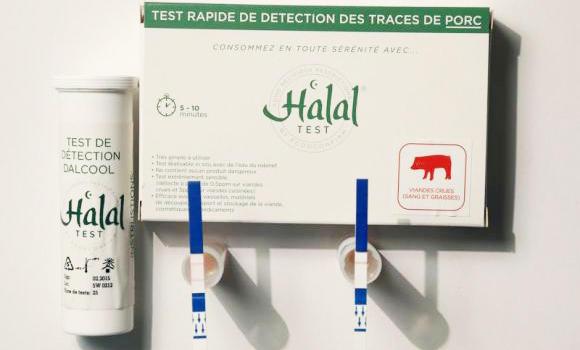
An illustration picture at Capital Biotech offices in Asnieres sur Seine shows a kit to test for the presence of pork in food for use by Muslims. (Foto: Reuters)
Paris, 13 Muharram 1436/6 November 2014 (MINA) – A French start-up is hoping to take a slice of the multi-billion Halal food market with a device allowing diners to find out within minutes whether a dish contains pork.
Capital Biotech has received orders from as far afield as Turkey, Chile and Indonesia for its “Halal Test” which tests within 10 minutes whether a food contains pork meat, forbidden for Muslims and Jews.
Launched only a fortnight ago, the company has won nearly 100,000 ($135,000) in orders, a “surprise” according to co-founder Jean-Francois Julien, Arab News quoted by Mi’raj Islamic News Agency (MINA) as reporting.
The company acknowledges that the test, a one-use device costing 6.90 euros, does not constitute a complete “Halal” test, which also requires information about how the animal was slaughtered.
Also Read: Global Movement to Gaza to Hold Coordinated Rallies in 13 Cities on International Day of Solidarity
But it “allows you to dispel a one-off doubt, for example when you are on holiday or when a new “Halal” product hits the market,” said Julien.
To use the device, the cautious diner mixes a small amount with hot water and inserts a small strip into the mixture. The strip tests for pork proteins and takes less than 10 minutes.
France’s five million Muslims (the largest population in Europe) have been hit with food scandals — in 2011, “Halal” sausages were discovered to contain pork — and want to be sure they are not eating forbidden food, said Abbas Bendali from marketing firm Solis.
Capital Biotech believes however that 70 percent of its sales will eventually come from professionals who want a quick way of testing whether food is suitably for non pork eaters.
Also Read: Russia Warns Trump’s Gaza Plan Could Enable “Uncontrolled Experiments” on Occupied Territory
Bendali said the cost of the device would inevitably deter individuals “at a time of economic crisis.”
“It’s difficult to invest seven euros to test a bowl of pasta that costs three,” he said.
Muslims are more reassured by “a genuine Halal certificate,” he said.
Food allergies
Also Read: Activist Unfurls Palestinian Flag During German Parliament Session, Protesting Gaza Policy
But the firm is not limiting itself just to pork, hoping to make itself the firm of reference for tests on all types of food allergies.
It intends to launch soon a range of tests for soya, egg or almonds — all potential allergens — in ready meals. The firm will then roll out tests for gluten, peanut or milk. In the long-run, the start-up plans to extend its quick-fire testing to pharamceutical products.
However, Faycal Bennatif, marketing director of the world’s top biological analysis group Eurofins, told AFP it was not down to the consumer to perform quality tests on food products.
In the wake of the horsemeat scandal that rocked Europe last year, Eurofins has been inundated for requests to test meat products but has not developed a quick-fire test.
Also Read: Hundreds Rally in Stockholm to Condemn Israeli Attacks and Ceasefire Violations in Gaza
“We work with DNA sequencing in the lab which is not at all the same method,” said Bennatif, adding he was “dubious” as to how efficient the new quick tests were.
Capital Biotech’s “Halal tests” do not require authorization to be launched on the market, estimated at 5.5 billion euros ($6.8 billion) in France alone, although authorities will examine the reliability of the testing method.
Expert in allergens Jocelyne Just said the tests were a “first” but should be treated with caution “in the sense that a patient can be allergic to one food form but not another, for example to raw milk but not pasteurised.”
As for Capital Biotech, the start-up already has its eye on the next market by securing domain names for “kosher tests.” (T/P001/P3)
Also Read: Mass Protests Erupt in Bologna Against Israeli Teams Ahead of EuroLeague Match
Mi’raj Islamic News Agency (MINA)

































 Mina Indonesia
Mina Indonesia Mina Arabic
Mina Arabic